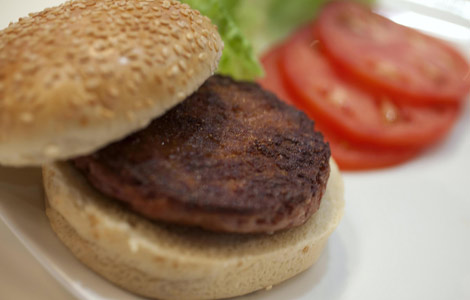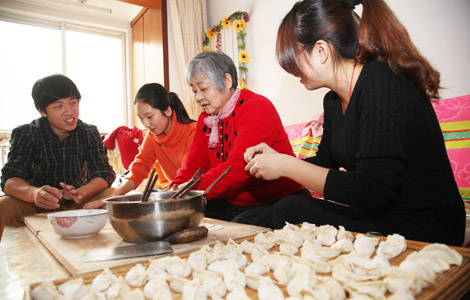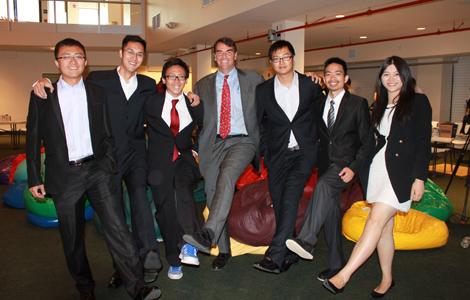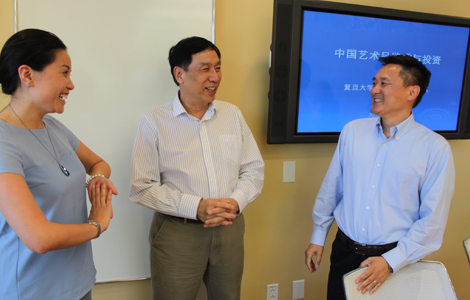Learning fusion cooking from the roots up
Updated: 2013-08-05 13:52
By Caroline Berg in New York (China Daily)
|
||||||||
Chinese chef favors flavor over tradition
Diana Kuan grew up with an experiment-prone mother who had no qualms about bending the rules, even when it came to traditional Chinese cooking. Her family ran a Latin-flavored Chinese restaurant in Puerto Rico, and later a Polynesian-style take-out and Chinese bakery in suburban Boston.
These days, Kuan is carrying on the family tradition of experimental Chinese cooking in New York. After she published her first cookbook - The Chinese Takeout Cookbook: Quick and Easy Dishes to Prepare at Home (Random House, 2012) - last year, Kuan has been devoting more and more time to teaching Chinese cooking in classrooms around New York City.
On her blog, Appetite for China, Kuan announced a series of cooking classes - some new, some old favorites - for the month of August. This weekend, she kicked off the series by conducting a "very hands-on" dumpling making workshop for eight people, seven of whom were non-Chinese, at 3rd Ward, a workspace and education center in Brooklyn.
"People usually seem to be a little more intimidated by Chinese cooking, especially with something like dumpling making," said Kuan, who helped her class make everything, including the dumpling and wonton wrappers, from scratch. "The main reason why I teach and write about Chinese food is to show how approachable it is."
Kuan is trained in French cooking and started a career in teaching Chinese cooking classes in 2008 at The Hutong in Beijing, China. She has lived in New York off and on since 2005.
"I like the direction Asian cuisine is going in New York," Kuan said. "There are a lot of newer immigrants from all around China arriving in New York, so you're finding more options outside just Cantonese or Sichuan, with more regional cooking from places like Yunnan and Taiwan gaining more popularity."
On the other end of the spectrum, Kuan said she's also excited about the non-traditional Chinese restaurant scene emerging in New York.
"I like that there are more experimental approaches to Asian cooking, too," Kuan said. "It doesn't have to be the strict, very traditional formula."
She gave the popular Mission Chinese restaurant as an example, where the menu uses flavor bases and techniques from Chinese cooking to create surprising and adaptive new dishes.
Kuan said she gets a lot of inspiration for her recipes from browsing farmers markets.
For instance, Kuan has used ramps, which she compared to wild leeks and are only available for three to four weeks every spring, in her stir-fries and dumplings in place of scallions.
In her class on Saturday, Kuan made two separate fillings - vegetable and meat - for her wontons and dumplings. One filling consisted of kale, shiitake mushrooms and scallions; the other was turkey with mushrooms and scallions.
Today, Kuan teaches a class on Sichuan cooking at the Brooklyn Brainery. Other classes this month include a course on Chinese vegetarian home cooking at 3rd Ward, Hong Kong-style dim sum at the Institute of Culinary Education and a couple of dumpling and wonton classes at the Brooklyn Brainery.
On Aug 25, Kuan will team up with Indian chef Chitra Agrawal to produce a vegetarian, seasonal Indo-Chinese feast at the historic Wyckoff Farmhouse Museum. The meal, which is already sold out, will feature seven dishes served family style that highlight the summer's bounty, including some Indian vegetables grown locally by Wyckoff's head gardener Jason Gaspar.
The feast, which the two chefs call "Tangra," is inspired by the Tangra neighborhood in Calcutta, India, which is home to generations of Hakka Chinese and where the cuisine mixes Chinese food traditions with Indian ingredients.
The chef said she sometimes encounters resistance from people, particularly those who are just starting to learn about authentic Chinese cuisine and may have spent some time traveling around China, who think Chinese food should be prepared in a strictly traditional fashion.
"I don't really like the whole authentic versus non-authentic debate," said Kuan, whose favorite take-out dish she makes is General Tso's chicken. "I just care about whether the food tastes good."
carolineberg@chinadailyusa.com
(China Daily USA 08/05/2013 page2)

 First taste of test-tube burger close to meat
First taste of test-tube burger close to meat
 Govt urged to take care of parents who lose child
Govt urged to take care of parents who lose child
 1 dead, dozens injured in Urumqi bus fire
1 dead, dozens injured in Urumqi bus fire
 Lei Feng's African brother
Lei Feng's African brother
 EU SMEs target niche markets in China
EU SMEs target niche markets in China
 British couple caring for special children
British couple caring for special children
 Fly for adventure at US air show
Fly for adventure at US air show
 Kobe Byrant meets fans in Shenzhen
Kobe Byrant meets fans in Shenzhen
Most Viewed
Editor's Picks

|

|

|

|

|

|
Today's Top News
US plays catch up in Africa
China's C919 to break Boeing, Airbus dominance
Brunei bans tainted Fonterra dairy products
7 arrested for polluting S China river
Dialogue defuses EU, China solar case
Drifting left, Asian American voters still back John Liu
Beijing sincere on S China Sea Code of Conduct
Washington Post sold to Amazon's founder
US Weekly

|

|





